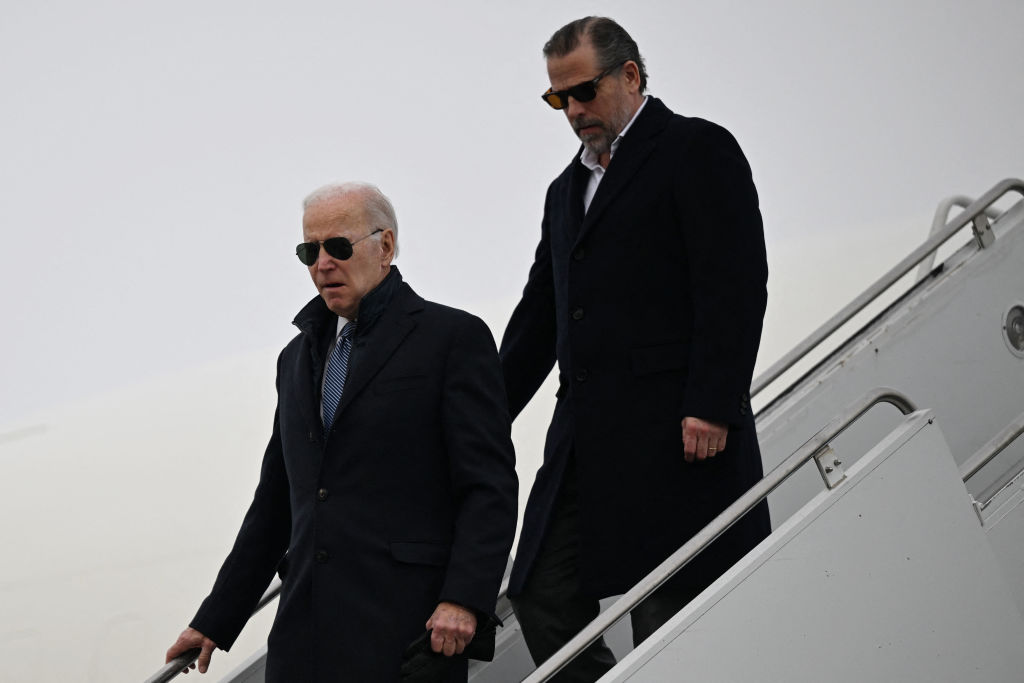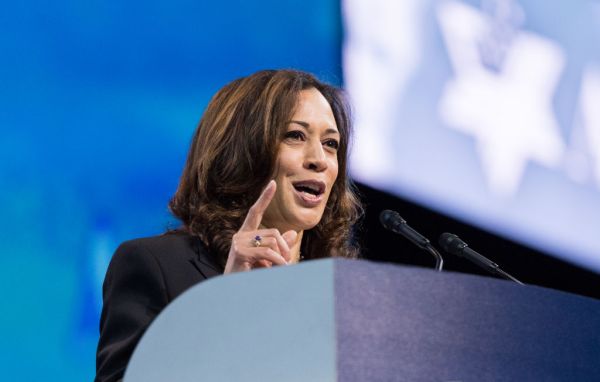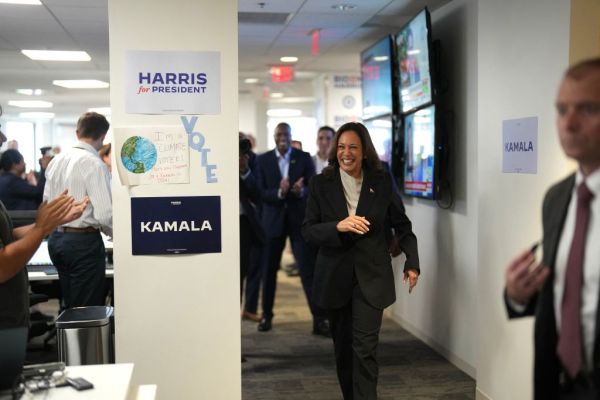Rep. James Comer walked into a media briefing room inside the U.S. Capitol Wednesday morning and announced to reporters that the House Oversight Committee has made “astonishing progress” in its investigation of the Biden family’s business deals.
“I want to be clear,” he said. “This committee is investigating President Biden and his family’s shady business deals that capitalized on Joe Biden’s public office and risked our country’s national security.”
Over the course of the next hour, Comer, who chairs the committee, and fellow Republicans on the panel pontificated about the contents of the 36-page memo they released laying out “evidence indicative of influence peddling and financial deception” by members of the Biden family.
Comer and his colleagues haven’t yet presented evidence tying Joe Biden to the dubious financial transactions of his family members. But Wednesday’s memo is another log on the fire of the scandals and legal worries of Biden’s son Hunter, who is also under investigation by the Department of Justice.
Here’s where both investigations stand.
What evidence do Republicans have?
The Republicans on the Oversight Committee hinted at the direction of their investigation in March when they released a four-page memo primarily focused on the financial records of Rob Walker (an associate of the Biden family) and his company. Wednesday’s 36-page memo includes some of the same information but is much more comprehensive, relying on “thousands of bank records” acquired via four subpoenas.
While Wednesday’s press conference included some spin from Comer and other members of the committee, there is no reason to doubt the veracity of the bank records themselves.
The memo includes a list of 21 Biden-family-adjacent companies formed between 1998 and 2017, 15 of which were created while Joe Biden was vice president. Some of these companies funneled money from foreign sources to members of the Biden family. One example of several: In 2015, a Romanian company called Bladon Enterprises paid roughly $180,000 to Robinson Walker LLC—Rob Walker’s business account. Over the next few days, Walker transferred $59,000 from the account to a personal account, and then again from his personal account to an account owned by Hunter Biden. That was just the beginning of a series of payments extending into 2017 in which Biden bank accounts received a total of approximately $1 million from Bladon Enterprises—a company owned by Gabriel Popoviciu, a Romanian businessman who was convicted of corruption charges in 2016.
Popoviciu had retained Hunter Biden as a lawyer in 2015, but the GOP lawmakers argue the payments from Bladon Enterprises were separate from that legal work.
Similarly, the Robinson Walker LLC account also served as a middleman account between State Energy HK Limited—a Shanghai-based energy company connected to an influential Chinese tycoon—and the Biden family. In March 2017, State Energy HK sent Robinson Walker LLC $3 million—and over the next few weeks, $1.065 million was wired from Robinson Walker LLC to at least five different Biden family accounts.
According to Comer, at least nine Biden family members (not including Joe Biden) have benefitted from foreign payments, which the memo says totaled more than $10 million between the time Joe Biden became vice president and now. Republicans’ accusations of “influence peddling” rest on the assumption that apparent business relationships between Biden family members and influential foreign nationals would have been unlikely had Joe Biden not been vice president.
Can Republicans prove wrongdoing?
The transactions laid out in the memo certainly look bad—but were they illegal? Although the GOP lawmakers did not dwell on specific laws the Bidens may have broken, they suggested the complicated schemes add up to criminal wrongdoing.
“The DOJ needs to get off its ass and investigate,” South Carolina Rep. Nancy Mace said. “We’ve done the work for them, so they can’t screw it up. If these allegations—any of these allegations—are proven true, then someone with the last name Biden needs to be charged, prosecuted, and maybe spend a little time in prison.”
Based on the information in the memo, Comer, Mace, and the other Republicans can confidently say that Joe Biden has made false statements about his family’s finances, such as when he denied during the 2020 campaign that Hunter had received money from China, or when he recently said that it is “not true” that Hunter and other family members’ bank accounts had received Chinese money.
But despite Comer’s belief that “the president has been involved in this from the very beginning,” the GOP lawmakers have yet to prove that Joe Biden personally knew about or participated in his family members’ dubious transactions. In their own memo, the Democrats on the committee argued that the financial “suspicious activity reports” reviewed by the committee do not “allege, or even suggest, any potential misconduct by President Biden, nor do they show President Biden’s involvement in Hunter Biden’s financial or business relationships.” The Democratic memo does not defend the substance of the transactions, but it argues that some of them were flagged as “suspicious” simply because of pre-existing partisan investigations and negative media attention directed at Hunter Biden.
What unanswered questions remain?
As the Oversight Committee investigation continues, Comer is hoping to get information from two currently anonymous whistleblowers: one from the FBI alleging a bribery scheme involving then-Vice President Biden himself, and the other from the Internal Revenue Service alleging political interference in the DOJ’s investigation. On Wednesday, the FBI refused to turn over the specific document Comer and Sen. Chuck Grassley had requested last week, saying it could harm investigative work. But the IRS whistleblower is already working with Congress.
Given Hunter Biden’s past work experience as a lawyer and registered lobbyist, the purposes of the payments made to him and family members will likely also come under further scrutiny.
The DOJ investigation continues.
The extent of overlap between the congressional investigation and the ongoing DOJ investigation into Hunter Biden also remains to be seen. The grand jury in the DOJ case has heard testimony on a range of potential misconduct, including money laundering and violation of the Foreign Agents Registration Act (FARA)—though recent reporting has suggested that charges would be more likely to be filed on tax-related crimes and lying on a gun purchase.
The investigation began during the Obama administration before broadening in scope during the Trump administration. Since 2018, it has been led by David Weiss—the Trump-appointed U.S. attorney in Delaware who was asked to stay on board by the Biden administration, largely to avoid any perception that the president was interfering in the investigation on behalf of his son.
References to money laundering and FARA have dropped out of most media coverage of the investigation since last October, when the Washington Post reported that anonymous “federal agents” had “gathered what they believe is sufficient evidence” to charge Hunter with lying on a gun-purchase form as well as tax-related crimes.
As part of the federal background check process, prospective gun owners must fill out Form 4473, which asks if the applicant is “an unlawful user of, or addicted to, marijuana or any depressant, stimulant, narcotic drug, or any other controlled substance.” When buying a handgun in 2018, Hunter allegedly checked the “no” box—even though his 2021 memoir recounts that he was a cocaine user at the time. Knowingly making a false statement in the acquisition of a firearm and possessing a firearm while unlawfully using drugs are both felonies.
The exact nature of the potential tax charges is less clear-cut than the gun violations. Hunter Biden’s past failure to pay what he owed in taxes could feasibly be related to the concealment of the money he and others received as part of the overseas business deals being investigated by the congressional committee.
Whether Hunter Biden committed federal crimes is a straightforward legal question—but Weiss has broad prosecutorial discretion in deciding whether to charge him.
“The reality is that lots of people commit federal crimes and charges are not brought in most cases,” said Robert Leider, a law professor at George Mason University. For lying on Form 4473 in particular, prosecutors bring charges in only a small fraction of cases.
“One of the disadvantages of having an extremely expansive federal criminal law is you have to sort who you’re charging and who you’re not,” Leider said.
In this case, the officials who would typically provide political accountability for prosecutors’ decision-making—President Biden and his appointees—have a conflict of interest.
If Hunter Biden is charged, his defenders could argue he is being singled out by a Trump-appointed prosecutor because President Biden is his father. But if he isn’t charged, Republicans could just as easily argue that he is getting special treatment because he is the president’s son.









Please note that we at The Dispatch hold ourselves, our work, and our commenters to a higher standard than other places on the internet. We welcome comments that foster genuine debate or discussion—including comments critical of us or our work—but responses that include ad hominem attacks on fellow Dispatch members or are intended to stoke fear and anger may be moderated.